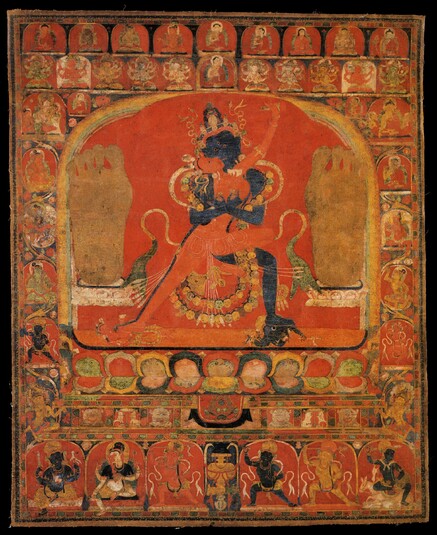
Item: Chakrasamvara (Buddhist Deity)
| Origin Location | Tibet |
|---|---|
| Date Range | 1200 - 1299 |
| Lineages | Drigung (Kagyu) and Buddhist |
| Material | Ground: Cotton |
| Collection | Private |
Classification: Deity
Chakrasamvara, Sahaja Heruka, with the footprints of Drigung Tangpa Chenpo at the right and left.
Tibetan: Khor lo dem chog
In the center of the composition is Chakrasamvara Sahaja Heruka, blue in clour, with one face and two hands, embracing the consort Vajravarahi, red in colour.
In the top register, starting at the left corner, are Shakyamuni Buddha, Vajradhara, Tilopa, Naropa, Pagmodrupa, Gampopa, Milarepa, Marpa, and Medicine Buddha.
In the second register, starting at the left, are Samaya Vajra, Gauri, Buddha Lochana, Mamaki and Samantabhadri. In the center of the row is Rinchen Drigungpa, the founder of the Drigung Kagyu School of Tibetan Buddhism. Following in the row are Mohavajra, Dveshavajra, Matsaryavajra, Ragavajra, and Irshyavajra. Each of the ten female deities have three faces and six hands, and hold various attributes. Two small Tibetan figures wearing monastic robes are placed in the corners above the rainbow arch.
Descending vertically in the two outer registers are the Eight Great Siddhas. Beginning on the left are King Indrabhuti, with Virupa on one side and Lakshminkara on the other. Below that is Dombi Heruka riding atop a tiger with his consort. Below that is Saraha in a standing posture and holding a bow across the shoulders, accompanied by two consorts. Below that is Kukkuripa, holding a dog. Descending on the right are Nagarjuna seated on the right side of Shakyamuni Buddha with Atisha seated on the other side of the Buddha. All three are dressed in the robes of a monk. Below Nagarjuna is Luipa with both hands raised up and dressed in the attire of a mahasiddha. Below that is Padmavajra, red in colour. Below that is Vajra Ghantapa, holding a vajra scepter and a bell.
At the lower left side above the bottom register is Achala, blue in colour, holding sword in the upraised right hand. Below that is a Nagaraja figure. At the lower right is Vajravarahi, red, holding a curved knife in the upaised right hand and standing in a dancing posture. Below that is another Nagaraja figure.
In the bottom register starting at the left are Chaturbhuja Mahakala, seated, with four hands, Ganapati with an elephant head and four hands, Hayagriva holding a stick, Vajrapani holding a vajra scepter, Ushnisha Chakravartin, yellow in colour, and Shri Devi with one face and two hands, riding a donkey.
There are four paintings with the same general composition two of which appear to be one copied from the other. See paintings 58301, 65205, 81410 and 81411.
Jeff Watt 9-2006
Eternal Presence, Handprints and Footprints in Buddhist Art. Kathryn H. Selig Brown. Plate 8, page 41.
Publication: Eternal Presence
Thematic Sets
Subject: Footprints & Handprints (Footprints Only)
Subject: Footprints & Handprints Iconography
Subject: Footprints & Handprints Masterworks
Teacher: Jigten Sumgon Biography
Teacher: Jigten Sumgon Footprints
Tradition: Drigung Kagyu Main Page
Subject: Footprints (Chakrasamvara)
Painting Style: Indian (Footprints)
Subject: Footprint Paintings (Early Works)
Buddhist Deity: Chakrasamvara (Early Kagyu Painting)
Subject: Footprints & Handprints (Kagyu)
Buddhist Deity: Chakrasamvara Main Page
Painting Style: Indian (Drigung Subjects)
Subject: Eight Siddhas In One Painting
Subject: Footprints & Handprints Main Page
Teacher: Jigten Sumgon Main Page
